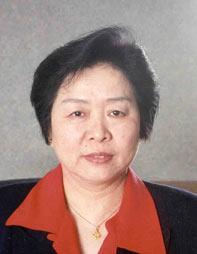|
Central bank: Market forces to drive yuan
(Reuters/Caijing)
Updated: 2006-02-19 17:16 The People's Bank of China is committed to letting
market forces drive exchange rates and interest rates, Wu Xiaoling, a deputy
governor of the central bank, told Caijing magazine.

Wu Xiaoling, deputy
governor of the central bank [file
photo] | Speculation persists that China might
announce another change in the value of the yuan, similar to last July's 2.1
percent revaluation, to avert criticism of its currency policy when President Hu
Jintao visits Washington in April.
But the central bank has repeatedly ruled out another administered change,
saying the managed float it introduced at the time of the July revaluation will
allow the forces of supply and demand to gradually determine the yuan's rate.
"Making interest rates and the foreign exchange rate market-oriented to
reflect supply/demand changes in the market has always been a goal that we have
pursued," Wu told Caijing, an influential business magazine.
While some people have argued that the yuan should be allowed to appreciate
further, Wu said it was difficult to assess correct levels of the currency and
that what was needed were moves to make the yuan more market-driven.
Caijing released the text ahead of publication on Monday.
Her comments came after she told Reuters last Tuesday that the yuan's faster
pace of appreciation this year had been the result of market forces.
"I think this is the result of market operations and what we want is to let
the market mechanism, based on supply and demand, play a role, she said.
The yuan can theoretically rise or fall by 0.3 percent a day against the
dollar but, to Washington's frustration, it has so far moved only a fraction of
that range in daily trading.
The White House, facing political pressure from a record US trade deficit,
renewed its call last week for Beijing to let the yuan trade more freely,
something it said was in China's own interest.
The yuan closed at 8.0483 per dollar on Friday. It has risen just 0.76
percent since the revaluation.
Chinese policy makers are aware of the political and economic risks posed by
the country's large trade and investment surpluses. To tackle them, Wu said
China needed to modify some of its economic policies to restrict capital inflows
and encourage outward investment.
China is also taking its time about freeing up interest rates. The PBOC sets
commercial banks' deposit rates and requires them to charge at least 90 percent
of the benchmark lending rate it fixes.
But the central bank approved interest rate swaps earlier this month, in what
it said was an unevitable part of the process of liberalising interest rates,
and state media say the bank is also considering a formula to adjust its
rediscount rate periodically.
She cited venture capital and the bond market as potential growth areas in
China's efforts to boost its underdeveloped capital market.
|